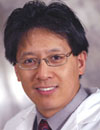|
|
|

|
Rising star in cancer research recruited
|
by Vicky Agnew
Hollings Cancer
Center
A rising star in the field of cancer immunology, Zihai “Zack” Li, M.D.,
Ph.D., will join MUSC’s Hollings Cancer Center (HCC) as the Centers of
Economic Excellence (CoEE) Endowed Chair in cancer stem cell biology.
One of the most innovative and promising fields of cancer research
during the last decade has been cancer immunology—finding ways to help
the body’s immune system recognize and fight cancer cells and control
tumor growth. Types of immunotherapy, such as cancer vaccines and
antibody treatment, have the potential to be more effective, more
targeted and less toxic than traditional cancer treatments.
 Dr. Zack Li Dr. Zack Li
Li’s work captured international attention when his study was published
in the October 2009 issue of “Stem Cells.” The study revealed the
potential for human stem cells to be used in the creation of a vaccine
to protect against colon cancer and potentially other types of cancer
as well.
Li will lead the CoEE in cancer stem cell biology. MUSC and Clemson
University are partners with CoEE along with Health Sciences South
Carolina. Also, Li will direct the cancer immunology program at HCC and
serve as co-director of the Cell Therapy Facility and professor of
medicine, microbiology, and immunology at MUSC.
“Dr. Li is a dynamic individual who has been recognized as an
outstanding clinician, translational scientist, teacher and mentor,”
said John R. Raymond, M.D., vice president for academic affairs and
provost and DCI Professor of Medicine. Raymond noted that Li’s work
could lead to cell-based therapies and new drugs to help the immune
system fight cancer. The development of such treatments in South
Carolina could result in job and economic growth. Li already holds a
U.S. patent and four investigational new drug applications approved by
the U.S. Food and Drug Administration. He also has received several
grants from the National Institutes of Health to fund his work.
Li said he decided to relocate to South Carolina from the University of
Connecticut because of MUSC’s tremendous growth in biomedical research
and because HCC holds National Cancer Institute designation, one of
only 65 such centers in the nation and the only one in South Carolina.
Li also was attracted by MUSC’s award of a highly competitive Clinical
and Translational Science Award from the National Institutes of Health
as well as the state’s CoEE Program, which reflects a statewide
commitment to research and innovation.
“The CoEE Program played a huge role in my decision to move my lab to
MUSC,” Li said. “The CoEE Program to me is a long-term commitment by
South Carolina to support ingenious science that benefits the citizens
of South Carolina and stimulates economic and job growth.”
At HCC, Li will be working to develop safe and efficient cancer
vaccines, to uncover the power of stem cells for cancer therapy, and to
decode the mystery of basic guiding principles of how the immune system
works to defend against a variety of diseases. Li believes his work
could have several commercial applications and lead to job creation in
South Carolina.
“I want to move our work closer and closer to finding a cure for human
cancer,” he said. “These efforts of biomedical research could lead to
the launch of clinical trials and eventually to the development of new
diagnostics and therapeutics for human diseases. Our work will
stimulate job growth in the health care industry and biomedical
research.”
In addition, he believes that his work could improve the quality of
life in South Carolina.
“We are contributing to the betterment of human health in general. Our
clinical studies will be done in South Carolina which will directly
benefit South Carolinians. We will also contribute to the training and
retaining of skillful jobs, all of which will lead to improvement of
the quality of life in South Carolina.”
Friday, June 4, 2010
|
|
|



